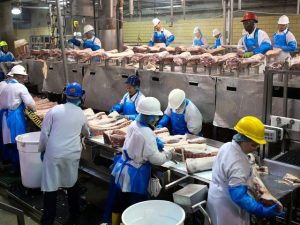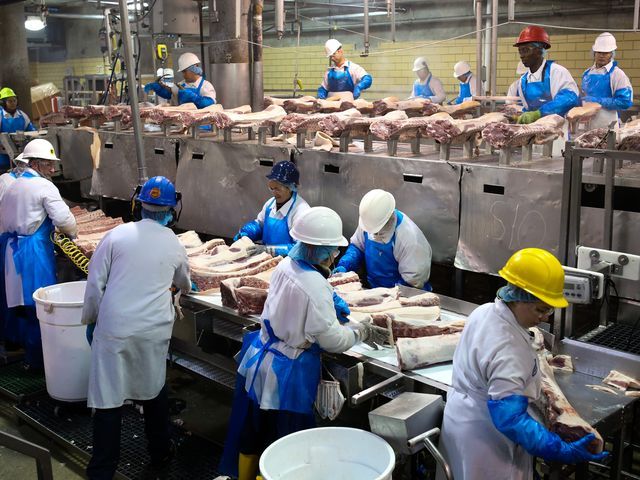In the fast-paced world of meat processing, efficiency isn’t just a goal—it’s a daily demand. Whether you’re working in a commercial abattoir, a local butcher shop, or a game processing facility, the right tools can make all the difference. Among the most essential are skinning knives UK professionals rely on to deliver clean cuts, reduce waste, and maintain safety standards.
These aren’t your average kitchen blades. Meat processing knives are engineered for precision, durability, and comfort, helping skilled workers perform repetitive tasks with speed and accuracy. From hide removal to carcass breakdown, the right knife transforms a heavy job into a streamlined process.
Why the Right Skinning Knife Matters
Skinning is one of the most labour-intensive tasks in meat processing. A poorly designed knife can slow down operations, increase waste, and even pose safety risks. That’s why professionals turn to specialised meat processing knives that are engineered for performance.
Key Benefits of High-Quality Skinning Knives
- Precision blades for clean cuts and minimal waste
- Ergonomic handles to reduce hand fatigue during long shifts
- Durable materials like stainless steel for longevity and hygiene
- Easy maintenance with blades that hold their edge and resist corrosion
Choosing the Best Skinning Knives in the UK
The UK market offers a wide range of options, from traditional curved blades to modern ergonomic designs. When selecting your knife, consider:
Blade Type
- Curved blades: Ideal for large carcasses, offering smooth gliding motion
- Straight blades: Better for smaller animals or detailed trimming
- Flexible blades: Allow for better manoeuvrability around joints and contours
Handle Design
- Non-slip grips: Essential for safety in wet environments
- Moulded handles: Improve comfort and reduce strain
- Colour-coded options: Help maintain hygiene standards in multi-use facilities
Safety & Hygiene in Meat Processing
In environments like abattoirs and processing plants, hygiene is non-negotiable. The best abattoir supplies include knives that meet strict safety standards:
- Antimicrobial handles to reduce bacterial growth
- Easy-to-clean designs with minimal crevices
- Compliance with UK food safety regulations
- Colour coding to prevent cross-contamination between meat types
Sharpening & Maintenance Tips
Even the best knife is only as good as its edge. Regular maintenance ensures your skinning knives UK remain effective and safe:
- Use a honing steel daily to maintain the edge
- Invest in a professional sharpening service for periodic tune-ups
- Store knives in a protective sheath or magnetic rack to prevent damage
- Clean thoroughly after each use with food-safe detergents
Top Brands to Watch
When sourcing meat processing knives, consider these trusted names in the UK market:
Where to Find Reliable Abattoir Supplies
For professionals in the meat industry, sourcing from trusted abattoir supply providers ensures quality and compliance. Look for suppliers who offer:
- CE-certified tools
- Custom sharpening services
- Bulk order discounts
- Fast delivery across the UK
Ergonomics & Worker Wellbeing
Long hours in meat processing environments can take a toll on workers. Choosing knives with ergonomic features helps reduce strain and injury:
- Contoured handles that fit naturally in the hand
- Lightweight designs to reduce wrist fatigue
- Balanced weight distribution for smoother motion
- Textured grips for better control in wet conditions
Sustainability in Knife Manufacturing
Modern consumers and businesses alike are prioritising sustainability. Some skinning knives UK manufacturers are stepping up:
- Using recycled steel and eco-friendly packaging
- Offering blade recycling programmes
- Designing knives for long-term use to reduce waste
- Partnering with carbon-neutral shipping providers
Training & Technique: Getting the Most from Your Knife
Even with top-tier skinning knives UK suppliers provide, skill and technique are what truly elevate performance. Proper training ensures safety, speed, and consistency across your team.
Essential Training Areas
- Grip and posture: Teach workers to hold knives correctly to reduce strain and improve control
- Cutting technique: Focus on smooth, confident strokes to avoid jagged edges and wasted meat
- Knife safety protocols: Reinforce blade awareness, safe storage, and emergency procedures
- Routine inspections: Encourage regular checks for blade damage, handle wear, and hygiene compliance
Onboarding New Staff
For new hires in abattoirs or processing plants, hands-on training with meat processing knives should include:
- Knife selection guidance based on role and carcass type
- Live demonstrations of skinning and boning techniques
- Shadowing experienced staff to build confidence
- Access to training materials like videos and manuals from abattoir supplies providers
Investing in training doesn’t just protect your team—it protects your bottom line. Skilled workers using the right tools are faster, safer, and more consistent.
Performance Comparison: Blade Types
Here’s a quick comparison of blade types and their ideal applications:
Customisation Options for Professionals
Some suppliers offer customisation to meet specific needs:
- Laser engraving for branding or identification
- Blade length options for different carcass sizes
- Handle colour selection for hygiene zones
- Custom kits with sharpening tools and holsters
Final Thoughts
Precision, Safety, and Speed
In meat processing, time is money—and safety is everything. Investing in high-quality skinning knives UK professionals trust means fewer injuries, faster workflows, and better product quality. Whether you’re upgrading your toolkit or outfitting a new facility, the right meat processing knives and abattoir supplies are the backbone of a successful operation.
Don’t settle for dull blades or tired hands. Equip your team with tools that make light work of heavy jobs—and watch productivity soar. From ergonomics to sustainability, the right knife isn’t just a tool—it’s a game-changer.






